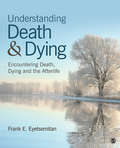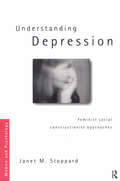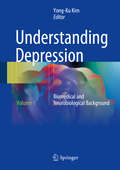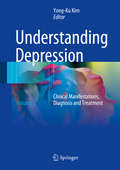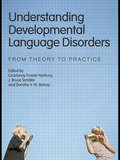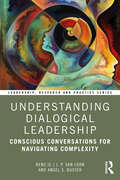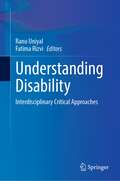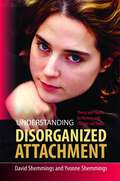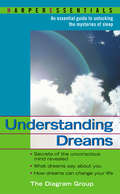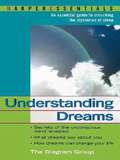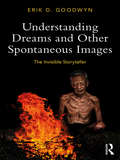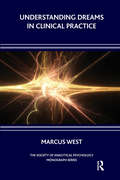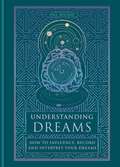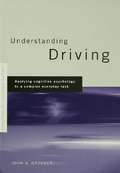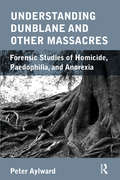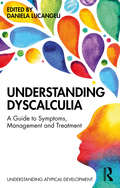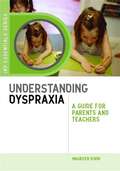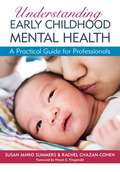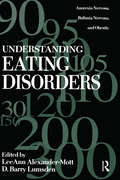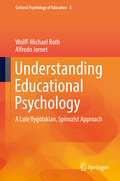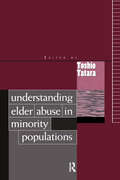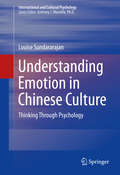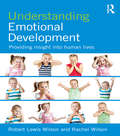- Table View
- List View
Understanding Death and Dying: Encountering Death, Dying, and the Afterlife
by Dr. Frank E. EyetsemitanUnderstanding Death and Dying by Frank E. Eyetsemitan teaches students about death, dying, bereavement, and afterlife beliefs by asking them to apply this content to their lives and to the world around them. Students see differing cultural experiences discussed in context with key theories and research. The text&’s pedagogy delivers relevant multi- and cross-cultural applications and connections across topics. This helps students evaluate their personal assumptions and appreciate how the content applies to their own current and future roles as individuals, family members, work colleagues, and as part of a community. The text simultaneously challenges learners to consider their own perspectives and to think critically about the parallels between their own lives and different cultures.
Understanding Death and Dying: Encountering Death, Dying, and the Afterlife
by Dr. Frank E. EyetsemitanUnderstanding Death and Dying by Frank E. Eyetsemitan teaches students about death, dying, bereavement, and afterlife beliefs by asking them to apply this content to their lives and to the world around them. Students see differing cultural experiences discussed in context with key theories and research. The text&’s pedagogy delivers relevant multi- and cross-cultural applications and connections across topics. This helps students evaluate their personal assumptions and appreciate how the content applies to their own current and future roles as individuals, family members, work colleagues, and as part of a community. The text simultaneously challenges learners to consider their own perspectives and to think critically about the parallels between their own lives and different cultures.
Understanding Depression: Feminist Social Constructionist Approaches (Women and Psychology)
by Janet StoppardWomen are particularly vulnerable to depression. Understanding Depression provides an in-depth critical examination of mainstream approaches to understanding and treating depression from a feminist perspective. Janet Stoppard argues that current approaches give only partial accounts of womens' experiences of depression and concludes that a better understanding will only be achieved when womens' experiences and lived realities are considered in relation to the material and social conditions in which their everyday lives are embedded. The impact of this change in approach for modes of treatment are discussed and solutions are suggested.Understanding Depression offers new insights into the problem and its treatment. It will prove useful to those with an interest in depression and gender as well as mental health practitioners.
Understanding Depression: Volume 1. Biomedical And Neurobiological Issues
by Yong-Ku KimThis book, in two volumes, focuses on contemporary issues and dilemmas in relation to depression. The aim is to equip readers with an up-to-date understanding of the clinical and neurobiological underpinnings of depression and their relation to clinical manifestations and the development of more effective treatments. This first volume is devoted specifically to biomedical and neurobiological issues. Detailed information is presented on a wide range of topics, including genetics, molecular and cellular biology, and aspects at the neural circuit and multicellular system levels. Readers will gain a deeper appreciation of the factors and interactions underlying individual variation in responsiveness to stress and vulnerability to depression, as well as a clear understanding of potential treatment targets and causes of treatment resistance based on the latest research. A concluding section considers progress towards precision psychiatry and gender and cultural differences in depression. The companion volume is dedicated to clinical and management issues in depression. Understanding Depression will be an excellent source of information for both researchers and practitioners in the field.
Understanding Depression: Volume 1. Biomedical And Neurobiological Issues
by Yong-Ku KimThis book, in two volumes, focuses on contemporary issues and dilemmas in relation to depression. The aim is to equip readers with an up-to-date understanding of the clinical and neurobiological underpinnings of depression and their relation to clinical manifestations and the development of more effective treatments. This first volume is devoted specifically to biomedical and neurobiological issues. Detailed information is presented on a wide range of topics, including genetics, molecular and cellular biology, and aspects at the neural circuit and multicellular system levels. Readers will gain a deeper appreciation of the factors and interactions underlying individual variation in responsiveness to stress and vulnerability to depression, as well as a clear understanding of potential treatment targets and causes of treatment resistance based on the latest research. A concluding section considers progress towards precision psychiatry and gender and cultural differences in depression. The companion volume is dedicated to clinical and management issues in depression. Understanding Depression will be an excellent source of information for both researchers and practitioners in the field.
Understanding Developmental Language Disorders: From Theory to Practice
by Courtenay Frazier Norbury J. Bruce Tomblin Dorothy V.M. BishopDevelopmental language disorders (DLD) occur when a child fails to develop his or her native language often for no apparent reason. Delayed development of speech and/or language is one of the most common reasons for parents of preschool children to seek the advice of their family doctor. Although some children rapidly improve, others have more persistent language difficulties. These long-term deficits can adversely affect academic progress, social relationships and mental well-being. Although DLDs are common, we are still a long way from understanding what causes them and how best to intervene. Understanding Developmental Language Disorders summarises the recent research developments in genetics and neuroimaging studies, assessment techniques and treatment studies to provide an overview of all aspects of DLD. The book investigates the possible genetic and biological causes of the disorder, how best to assess children's language skills to identify when and where communication breakdown occurs, what the long-term outcomes are for children who grow up with DLD, overlaps between DLD and other childhood disorders such as dyslexia and autism and how best to treat children with the disorder. Each chapter is written by a leading authority in the field in a format accessible to researchers, clinicians and families alike. This book, with its focus on both theory and practice, will be invaluable to students and researchers of speech-language pathology, psychology, psychiatry, linguistics and education. It will also be of interest to practicing speech-language pathologists, clinical psychologists, psychiatrists, educational psychologists, and teachers and parents of children with developmental language disorders.
Understanding Dialogical Leadership: Conscious Conversations for Navigating Complexity (Leadership: Research and Practice)
by Rens (E.) van Loon Angel S. BusterUnderstanding Dialogical Leadership emphasizes the power of dialogue, self-reflection, and shared decision-making in navigating the complexities of collaborative leadership, especially in the face of evolving challenges in modern life.The book underscores the importance of being conscious and open to diverse perspectives. The four pillars of dialogical leadership, which form the foundation of its philosophy, focus on flexible application of internal and external dialogues, self-awareness in leadership roles, proactive interchange of influence styles, and creating conditions for meaningful dialogues. A dialogue approach can provide answers to critical questions and wicked issues in the contemporary world, such as the balance between intellect and wisdom in the age of advanced technologies. The book positions dialogue as a dynamic force that brings people together, fostering an environment where valuable insights can emerge. The authors intertwine the ideas of Yuval Harari, David Bohm, Kenneth Gergen, Hubert Hermans, and other leadership authorities, highlighting the importance of relational reflection, with the practice of self-observation, meta-consciousness, and meditation. The objective is to create a collaborative and empowering environment that fosters innovation, trust, and the well-being of others.Transcending traditional leadership models by acknowledging the need for adaptability, self-awareness, and open communication, and including a chapter on dialogical leadership and artificial intelligence, this book encourages leaders to engage in conversations that bridge diverse perspectives and foster a deeper understanding of the self in a relational world and the complex challenges faced by humanity. It will appeal to leaders, coaches, and HR professionals, as well as those studying and looking to develop leadership.
Understanding Disability: Interdisciplinary Critical Approaches
by Ranu Uniyal Fatima RizviThis edited volume brings together contributions on disability studies organized around two themes: literary and sociological aspects. The contributors include academics, disability activists, and researchers from within and outside the Indian periphery. While the book strengthens the disability discourse and contributes to building academic scholarship on this subject, it also promotes disability activism by giving space to both direct practitioners and persons with disabilities. The chapters discuss various analytical and literary aspects of the marginalization experienced by the disabled community and bring forth new and elaborate perspectives. It draws connections across multiple identities and includes personal narratives across nations, cultures and societies. It is an excellent research resource on disability studies in India for scholars and students in the area of humanities, education, law, sociology and social work, while at the same time also addressing the global context.
Understanding Disorganized Attachment
by David Shemmings Yvonne ShemmingsDisorganized attachment, the most extreme form of insecure attachment, can develop in a child when the person who is normally meant to protect them is a source of danger. This usually leads to 'fear without solution' and the effects can be lasting and damaging. This book is a comprehensive and accessible text on disorganized attachment. It outlines what it is, how it can be identified and the key causes, including neurological, biochemical and genetic explanations. Factors that contribute to disorganized attachment are covered including unresolved loss and trauma, and the behaviour of caregivers. The authors also discuss evidence-based interventions to help families and carers as well as how to work with adults to prevent or minimize its occurrence. To root the theory in practice and to illustrate real-life examples of disorganized attachment case vignettes are included. With an authoritative research base, this accessible text will be invaluable to practitioners and academics in the fields of social care, psychology, counselling and allied health professions as well as undergraduate and postgraduate students.
Understanding Dreams
by The Diagram GroupIt has been said that dreams are the windows to the soul -- andnow those windows can be opened wide! The book you hold in your hands is a concise compendium of prescriptive information, an easy-to-use reference guide to the meanings and import of the remarkable visions that visit us while we sleep.Here in one volume are the essential keys to unlocking themysteries of the subconscious -- and to putting the power of dreams at your fingertips! The meaning behind more than 800 dream symbols The history of dream interpretation Lucid, repetitive, and sequential dreams Sleep patterns and the workings of the unconscious mind How to keep a "dream diary"
Understanding Dreams
by The Earthworks GroupIt has been said that dreams are the windows to the soul -- and now those windows can be opened wide! The book you hold in your hands is a concise compendium of prescriptive information, an easy-to-use reference guide to the meanings and import of the remarkable visions that visit us while we sleep. Here in one volume are the essential keys to unlocking the mysteries of the subconscious -- and to putting the power of dreams at your fingertips! The meaning behind more than 800 dream symbols, The history of dream interpretation, sleep patterns, the workings of the unconscious mind, How to keep a "dream diary, and more.
Understanding Dreams and Other Spontaneous Images: The Invisible Storyteller
by Erik D. GoodwynUnderstanding Dreams and Other Spontaneous Images: The Invisible Storyteller applies a contemporary interdisciplinary approach to dream interpretation, bringing cognitive anthropology, folklore studies, affective neuroscience, and dynamic systems theory to bear on contemporary psychodynamic clinical practice. It provides a practical guide for working with dreams that can be used by both individuals on their own and therapists working with clients. Erik D. Goodwyn invites us to examine key features of reported dreams, such as the qualities of the environment depicted, its familiarity or unfamiliarity, the nature of the characters encountered, and overall themes. This method facilitates an understanding of the dream in the full context of the dreamer’s life, rather than interpreting individual, isolated elements. Goodwyn also introduces the mental process which orchestrates dreams, conceptualised here as the ‘Invisible Storyteller’, and explores how understanding it can positively impact satisfaction in waking life. As a whole, the book provides a collection of tools and techniques which can be referred to time and again, as well as a wealth of examples. Exploring dreams as a natural source of clinical insight, The Invisible Storyteller will appeal to Jungian psychotherapists and analytical psychologists, other professionals working with dreams with clients, and readers looking for a scientific approach to dream interpretation.
Understanding Dreams in Clinical Practice (The Society of Analytical Psychology Monograph Series)
by Marcus WestThis book presents a simple, effective and illuminating way of understanding and working with dreams in clinical practice. It describes the mechanisms through which the mind/brain processes our experience and forms symbols, which embody a rich network of associations. It demonstrates how the dream and this network of associations can apply on a number of levels and thus shows how the full richness and vital importance of dreams, their meanings and purposes, can be explored. The book also explores the history, theory and science of dreams and dreaming. It reviews the debates between, and contributions from, Freud, Jung and other psychoanalysts, as well as the developments and discoveries from neuroscientists and dream laboratories, bringing the subject right up to date. Whilst the book primarily uses Jungian terminology, and highly values Jung's insights and approach to dreams, it gives a critical, contemporary account of the whole field of dream work and will be useful to practitioners of all theoretical persuasions.
Understanding Dreams: How to Influence, Record and Interpret Dreams
by Paul RolandDreams can be one our most valuable sources of self-knowledge - if we understand how to interpret their meaning and symbolism. Even if we awake from a nightmare that has seemed all too real, or a vivid dream teeming with what may be significant imagery, it is rare for us to reflect on it beyond breakfast, or make it more than the subject of an idle chat with friends. From the five stages of sleep to the effects of sleep deprivation, from Freud's legacy to the work of contemporary dream specialists, a wide range of material unfolds, all beautifully and lucidly described.Paul Roland explores:The science of sleep and dreams The effect of sleep deprivation Sensory deprivation Lucid dreams The psychology of sleep Freud's legacy and Jung and the House of Psyche Find out about waking dreams and dreams of prophecy, prediction, disaster, and inspiration or consult the Dream Directory for a closer analysis of more than 200 detailed dream scenarios.
Understanding Dreams: How to Influence, Record and Interpret Dreams
by Paul RolandDreams can be one our most valuable sources of self-knowledge - if we understand how to interpret their meaning and symbolism. Even if we awake from a nightmare that has seemed all too real, or a vivid dream teeming with what may be significant imagery, it is rare for us to reflect on it beyond breakfast, or make it more than the subject of an idle chat with friends. From the five stages of sleep to the effects of sleep deprivation, from Freud's legacy to the work of contemporary dream specialists, a wide range of material unfolds, all beautifully and lucidly described.Paul Roland explores:The science of sleep and dreams The effect of sleep deprivation Sensory deprivation Lucid dreams The psychology of sleep Freud's legacy and Jung and the House of Psyche Find out about waking dreams and dreams of prophecy, prediction, disaster, and inspiration or consult the Dream Directory for a closer analysis of more than 200 detailed dream scenarios.
Understanding Driving: Applying Cognitive Psychology to a Complex Everyday Task (Routledge Frontiers Of Cognitive Science Ser.)
by John A. GroegerThis book closely examines what is involved in driving. It identifies the aspects of perception, attention, learning, memory, decision making and action control which are drawn upon in order to enable us to drive, and the brain systems involved. It attempts to show how studying tasks such as driving can help to understand how these fundamental aspects of cognition combine to facilitate performance in complex everyday tasks. In doing so it shows how a very broad range of laboratory based findings can be applied, and that through our attempts to apply this knowledge to complex everyday tasks, we gain, in return, a greater understanding of fundamental aspects of human cognition.
Understanding Dunblane and other Massacres: Forensic Studies of Homicide, Paedophilia, and Anorexia
by Peter AylwardThe book predominantly explores the psychic histories of patients who display their transgenerational conflicts/trauma through forensic acts. It establishes the need to consider the details of patient history in understanding the patient within both the therapeutic encounter and the treatment team milieu. There are many themes of contemporary interest including gang murders, sibling jealousy, fatal eating disorder, personality disorder, and the effects of exclusion and marginalization within group and community dynamics and the global prevalence of mass murder. The author describes the collapse into dyadic thinking and enactment that prevails when the third perspective, classically represented by the father within the Oedipal dynamic, is excluded or absent. Providing detailed case studies he shows how seemingly meaningless explosions of violence or perversion are attempts to master early experiences of trauma and/or exclusion, often passed down unconsciously through the generations. Using the theories of Matte Blanco and notions of the 'critical date' the chapters give unique insight into the timing and triggers of crimes, however apparently random.
Understanding Dyscalculia: A guide to symptoms, management and treatment (Understanding Atypical Development)
by Daniela LucangeliThis accessible book provides evidence-based guidelines on dyscalculia, offering a thorough explanation of the science behind the disorder. It combines this theoretical framework with practical recommendations, offering interventions for managing the condition at home and school and avoiding potential behavioural consequences. Written in a straightforward style, this book provides a concise summary of relevant research to empower the reader to take an informed and positive approach to dyscalculia and those who live with it. The internationally based team of contributors examine the different models that explain the construct of dyscalculia, looking at definitions and theories alongside signs, symptoms and diagnosis. Chapters also explore how to communicate diagnosis to peers, possible cultural differences and sensitivities when related to mathematics education and dyscalculia and the importance of maintaining a proactive attitude when working with children with dyscalculia. Understanding Dyscalculia is essential reading for parents and practitioners in clinical and educational psychology, education professionals and students and researchers of special educational needs, educational psychology and counselling psychology.
Understanding Dyspraxia
by Maureen BoonThis fully-updated second edition of Helping Children with Dyspraxia has been revised to reflect current practice and developments, providing clear and positive answers to questions commonly asked by parents and teachers about dyspraxia. Maureen Boon draws on her considerable experience of working with children with movement disorders to identify the characteristics of dyspraxia, explaining assessment procedures and identifying what can be done to help. New reflections appear on concepts such as physical literacy and whether or not incidence of dyspraxia has increased, and in an overview of the characteristics and causes of the condition, a comprehensive update on how it is identified and assessed is provided. Terminology is reviewed, and the full range of therapeutic interventions that are available are outlined. New case studies and photographs are used to illustrate successful interventions in practice, and a helpful appendix with up-to-date details of useful publications, programmes, equipment and organisations is also included. Understanding Dyspraxia is a concise yet comprehensive handbook for parents and teachers. Its clear structure and practical, positive advice will make it an invaluable resource for anyone involved with a dyspraxic child.
Understanding Early Childhood Mental Health: A Practical Guide For Professionals
by Susan J. Summers Rachel Chazan-Cohen Hiram FitzgeraldAn easily accessible guidebook that presents effective strategies to integrate mental health services in early childhood programs and work in partnership with families to enhance young children's mental health.
Understanding Eating Disorders: Anorexia Nervosa, Bulimia Nervosa And Obesity
by LeeAnn Alexander Mott Barry D. LumsdenFirst published in 1994. As the incidence of eating disorders such as anorexia nervosa, bulimia nervosa and obesity sometimes caused by compulsive eating has risen, so has research and literature in the field. Presenting current knowledge of these eating disorders - the most common types found in adolescents and adults - this book addresses issues relevant to all.; Examining the pertinent history, aetiology, psychotherapy, and sociology, the contributors define these eating disorders and discuss issues of recovery and methods of treatment.; They also consider the problem as it exists in both male and females in this multicultural society. The resulting volume is divided into four parts: the first gives an overview in general, and the next three focus individually on anorexia nervosa, bulimia nervosa, and obesity respectively.
Understanding Educational Psychology
by Wolff-Michael Roth Alfredo JornetThis book takes up the agenda of the late (but unknown) L. S. Vygotsky, who had turned to the philosopher Spinoza to develop a holistic approach to psychology, an approach that no longer dichotomized the body and mind, intellect and affect, or the individual and the social. In this approach, there is only one substance, which manifests itself in different ways in the thinking body, including as biology and culture. The manifestation as culture is premised on the existence of the social. In much of current educational psychology, there are unresolved contradictions that have their origin in the opposition between body and mind, individual and collective, and structure and process--including the different nature of intellect and affect or the difference between knowledge and its application. Many of the same contradictions are repeated in constructivist approaches, which do not overcome dichotomies but rather acerbate them by individualizing and intellectualizing our knowledgeable participation in recognizably exhibiting and producing the everyday cultural world. Interestingly enough, L. S. Vygotsky, who is often used as a referent for making arguments about inter- and intrasubjective "mental" "constructions," developed, towards the end of his life, a Spinozist approach according to which there is only one substance. This one substance manifests itself in two radically different ways: body (material, biology) and mind (society, culture). But there are not two substances that are combined into a unit; there is only one substance. Once such an approach is adopted, the classical question of cognitive scientists about how symbols are grounded in the world comes to be recognized as an artefact of the theory. Drawing on empirical materials from different learning settings--including parent-child, school, and workplace settings--this book explores the opportunities and implications that this non-dualist approach has for educational research and practice.
Understanding Elder Abuse in Minority Populations
by Toshio TataraFirst published in 1999. Research on elder abuse in the United States has made great strides in recent years. As a result, we have been able to define and discover the causes of elder abuse, design tools to assess the risk of abuse, develop and implement treatment and prevention strategies, and evaluate programs for victims and perpetrators. However, this research has been derived from studies whose subjects were primarily Caucasian. This is not because elder abuse does not take place in minority communities, but rather because researchers wanted first to study the issue in its broadest sense.
Understanding Emotion in Chinese Culture
by Louise SundararajanThis mind-opening take on indigenous psychology presents a multi-level analysis of culture to frame the differences between Chinese and Western cognitive and emotive styles. Eastern and Western cultures are seen here as mirror images in terms of rationality, relational thinking, and symmetry or harmony. Examples from the philosophical texts of Confucianism, Daoism, Buddhism, and classical poetry illustrate constructs of shading and nuancing emotions in contrast to discrete emotions and emotion regulation commonly associated with traditional psychology. The resulting text offers readers bold new understandings of emotion-based states both familiar (intimacy, solitude) and unfamiliar (resonance, being spoiled rotten), as well as larger concepts of freedom, creativity, and love. Included among the topics: The mirror universes of East and West. In the crucible of Confucianism. Freedom and emotion: Daoist recipes for authenticity and creativity. Chinese creativity, with special focus on solitude and its seekers. Savoring, from aesthetics to the everyday. What is an emotion? Answers from a wild garden of knowledge. Understanding Emotion in Chinese Culture has a wealth of research and study potential for undergraduate and graduate courses in affective science, cognitive psychology, cultural and cross- cultural psychology, indigenous psychology, multicultural studies, Asian psychology, theoretical and philosophical psychology, anthropology, sociology, international psychology, and regional studies.
Understanding Emotional Development: Providing insight into human lives
by Rachel Wilson Robert Lewis WilsonUnderstanding Emotional Development provides an insightful and comprehensive account of the development and impact of our emotions through infancy, childhood and adolescence. The book covers a number of key topics: The nature and diversity of emotion and its role in our lives Differences between basic emotions, which we are all born with, and secondary social emotions which develop during early social interactions The development of secondary social emotions; and the role of attachmentand other factors in this process which determine a childs’ emotional history and consequental emotional wellbeing or difficulties. Analysing, understanding and empathising with children experiencing emotional difficulties. Drawing on research from neuroscience, psychology, education and social welfare, the book offers an integrated overview of recent research on the development of emotion. The chapters also consider child welfare in clinical and educational practice, presenting case studies of individual children to illustrate the practical relevance of theory and research. Written in an engaging and accessible style, the book includes a number of useful pedagogical features to assist student learning, including chapter summaries, discussion questions, and suggested reading. Understanding Emotional Development will provide valuable reading for students and professionals in the fields of psychology, social work, education, medicine, law and health.
